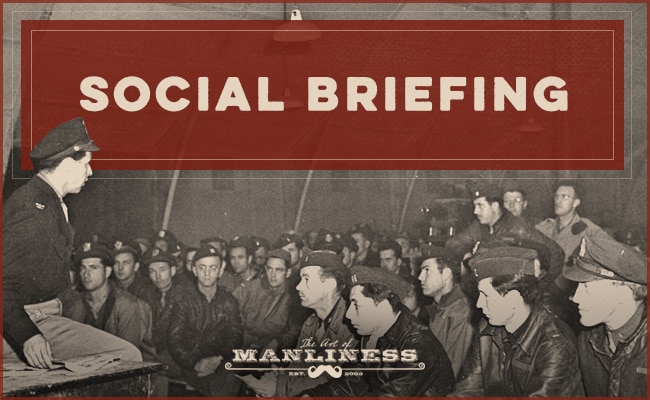
In every age, and every culture around the world, part of achieving manhood required gaining competence in the skills that amassed resources for one’s tribe, enhanced personal status, and led to reproductive success.
In primitive times, this set of skills largely fell into the “hard” category — abilities that allowed a man to hunt food and protect his kin.
With the dawn of civilization, bare survival became less of a concern, and the importance of “softer” skills — like knowing how to converse, act politely, dress, problem-solve, and so on — rose to become equally important. A man was expected to know not only how to handle a gun and make a fire, but also how to comport himself at a nice dinner and take a lady on a date.
Up through the middle of the 20th century, many men, from Theodore Roosevelt to my own grandfather, embodied this kind of rugged, yet artful savoir faire.
Today, hard skills remain satisfying to learn and master, but technology has made them even less essential to success, much less survival. One might think that the waning of hard skills would create a converse strengthening in soft ones. But this has decidedly not been the case. Rather, the same technological forces which have weakened harder aptitudes, have also crippled the softer kind. Indeed, with social interactions increasingly mediated by devices, the ability to confidently converse face-to-face and mix with flesh and blood humans has diminished significantly.
Yet, though technology has greatly altered the landscape of our personal, professional, and romantic lives, in-person interactions remain a stubbornly persistent part of our success in them.
You may get a job where you’ll be able to work remotely, but you’ll very likely need to nail a face-to-face interview in order to land it.
You may prefer to communicate with your colleagues by instant message or email, but you’ll still routinely be asked to attend meetings in the flesh and make professional business calls.
You may “talk” to your friends a lot through text and messaging apps, but you (hopefully) still hang out and converse in person too.
Your search for a girlfriend may begin on your phone, but it invariably leads to one outcome: a face-to-face meet-up.
Yes, even in the land of computers, smartphones, and apps, the rubber of socialization unfailingly meets the “meatspace†road.
In that friction point there exists a real “skills gap” between what men need to know to navigate and succeed in all areas of their life, and their actual competence with social encounters.
I’ve certainly noticed this gap in my interactions with my fellow Millennials, and you likely have too. Conversations that can go on for an hour without the other person asking you a single question about yourself. Discussions periodically punctuated by people checking (and even responding!) to text messages. Small talk that withers on the vine after just one or two questions. Limp handshakes. Lack of eye contact. And here’s one of my favorite cringe-worthy encounters to chuckle about: I once made a business call to several 20-somethings, who, following each time I said something, would put me on mute without saying so, talk amongst themselves about how to reply, unmute the call, and then respond. Boy, was that one awkward phone call.
And heck, I’m certainly not immune to some awkwardness myself; working at home on an online business, when I do interact face-to-face, I find that I sometimes feel like the Social Tin Man, who’s rusted out from disuse and whose every move feels creaky. I’ve really found that “people†skills are something I have to regularly brush up on, go over in my mind, and practice in the real world if I want to stay socially nimble.
Introducing Social Briefings
While charisma and affability are often thought of as inborn traits, they’re actually skills that anyone can practice — introverts and extroverts alike. And they’re skills worth working on.
Strengthening your social prowess allows you to enter any room with confidence, chat comfortably with strangers, charm the opposite sex, influence potential clients, and simply have a good time with other people wherever you go. It’s a skill set that allows you to navigate the world without anxiety, become more influential, and build a network of close friends, enjoyable acquaintances, and strategic allies. These benefits of social competence, it should be pointed out, apply whether you’re a white-collar guy or work in the trades; even in a job where manual skill is central to your success, the ability to converse with would-be customers, sell your services, and build trust is hugely important.
Whatever walk of life you’re from, the fact is you interact with people every single day. And each interaction represents a powerful opportunity — to meet your future spouse, a business contact, or a new friend — that can either be seized or botched. Given this interaction of risk and reward, you can rightly think of every social encounter as a kind of “mission.†But where can you get the needed intelligence to increase your chances of coming out the victor rather than a casualty?
That’s where we come in. Since nigh near everyone could seemingly use some extra squirts of oil in the creaky joints of our interactions, we’ve decided to start a twice monthly series called “Social Briefings.” Social Briefings will help you prepare for and navigate the minefields of social life and improve your face-to-face interactions by dispensing very short, practical tips that you can immediately start deploying in the field.
Stay tuned.


